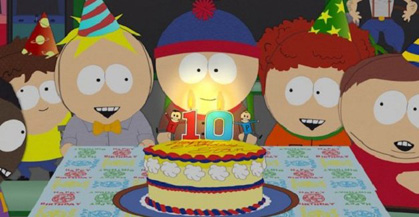Mythology: South Park
By Martin Felipe
June 14, 2011
BoxOfficeProphets.com

Of course, this is the comparison South Park has endured throughout its decade and a half run. In terms of volume, it pales in comparison to The Simpsons' output, with fewer seasons, and shorter seasons to boot. So to claim, as I do, that South Park remains more consistently brilliant in its later years than its Springfield counterpart is perhaps an unfair comparison, but it's true. Despite some inevitable grumblings in recent years that it ain’t what it used to be, I maintain that recent South Park measures up quite favorably to the classic episodes, and certainly more so than Simpsons.
It even has a Simpsons-esque mythology - a small town, a microcosm of the country, with a core group of characters and an ever-expanding supporting cast. The kids rarely age. They don’t even change their clothes. It’s the epitome of television stasis, a weekly reset, with possibly the cleverest parody of the television reset trope ever, the many deaths of Kenny McCormick.
All right, enough Simpsons talk, I’m going to look at South Park on its own merits. When it began in the late '90s, it was far less of a satire than it was a boundary pushing slice of wiseassery on the part of its creators Trey Parker and Matt Stone, which was enough for many fans. I know I respected those two right off the bat. Over a decade before Ricky Gervais slapped Hollywood’s Golden Globe wrist, Trey and Matt were a breath of fresh air in a world of ass kissing and back patting. I loved, and still do, their disregard for saying the accepted, white-washed Tinsel Town mutual admiration glad handing. They gave credit where due (praise for The Simpsons comes to mind), but showed little patience for show biz’s clique-like embrace of everyone who ever set foot on Sunset Blvd.
This brash biting of the hand that feeds them makes its way to their show, targeting any person of note whom Trey and Mat consider disingenuous. Even friends of the show like George Clooney aren’t immune to their criticism. One year, he’s recording voice work for them, another year they’re attacking his, in their view, smug Oscar speech.
This is all well and good, but what makes this show one for the ages is not its early embrace of extreme comedy, or its brazen disregard for Hollywood pretension. In its third season, the success of the show led Comedy Central to persuade Trey and Matt to make a movie. Often times, these big screen installments lead to decent, not extraordinary product. In the case of South Park, the movie turned out to be an acclaimed, biting attack on censorship, with plenty of their trademark foul language and taboo bursting comedy antics thrown in for good measure.
In the wake of the movie, the show started to take on a satirical bent itself. It’s strange how the evolution went. At first, it seemed to voice a typical Hollywood liberal bent. Then, I remember in particular after its attack on Rob Reiner’s proposed antismoking legislation, the conservatives adopted it as one of their own. In time, it became less and less clear what the show’s political affiliation was.
This is both to its strength and its detriment. Of course, as a liberal myself, I do enjoy me some satire of the right, but I do also think it’s refreshing to see other points of view coming out of Hollywood, as so much of it aligns with my own points of view. In the case of South Park, however, I’m starting to feel that the gist of the show’s satire as a whole is more apolitical than anything else. One could sum up Trey and Matt’s political stance as “Everybody relax”, a pretty middle-of-the-road position for such a brave pair and on such an edgy show. Nevertheless, whatever the themes of the show may be, few artists in Hollywood are willing to express themselves in such a bold, potentially off-putting way, and pushing their style as far as they do.
Even as most shows age and rest on the laurels of their success, South Park has been amazing over the years, giving the country a true water cooler episode or two almost every season. The Scientology episode, Imagination Land, Cartoon Wars, the episode where they say “Shit” over a hundred times, the Terrance and Phillip April Fool’s prank, and so on. Even this half-season finale featuring (SPOILER!) the divorce of the Marsh’s. Fifteen years later, Trey and Matt still have a knack for getting people talking.
And that’s what impresses me so much about them. While their positions may be unpopular amongst their peers or, in my opinion, a little watered down, there’s nothing watered down in the way they present those positions. For that matter, for them to have achieved such stellar success with satire, a form which often enjoys critical success, but not mainstream success, their triumph is that much more impressive. They have a distinct, clear, creative vision, are the premier satirists of our age, and I will follow their careers as long as they continue. South Park is contracted for a season or two more, at which point I’m pretty sure they’ll close up shop on Cartman and the gang. Broadway, the multiplex, whatever these two crazy kids whip up next, I’m willing to give it the benefit of the doubt. They’ve earned it. Against all odds.